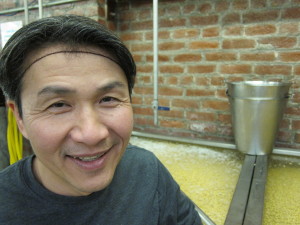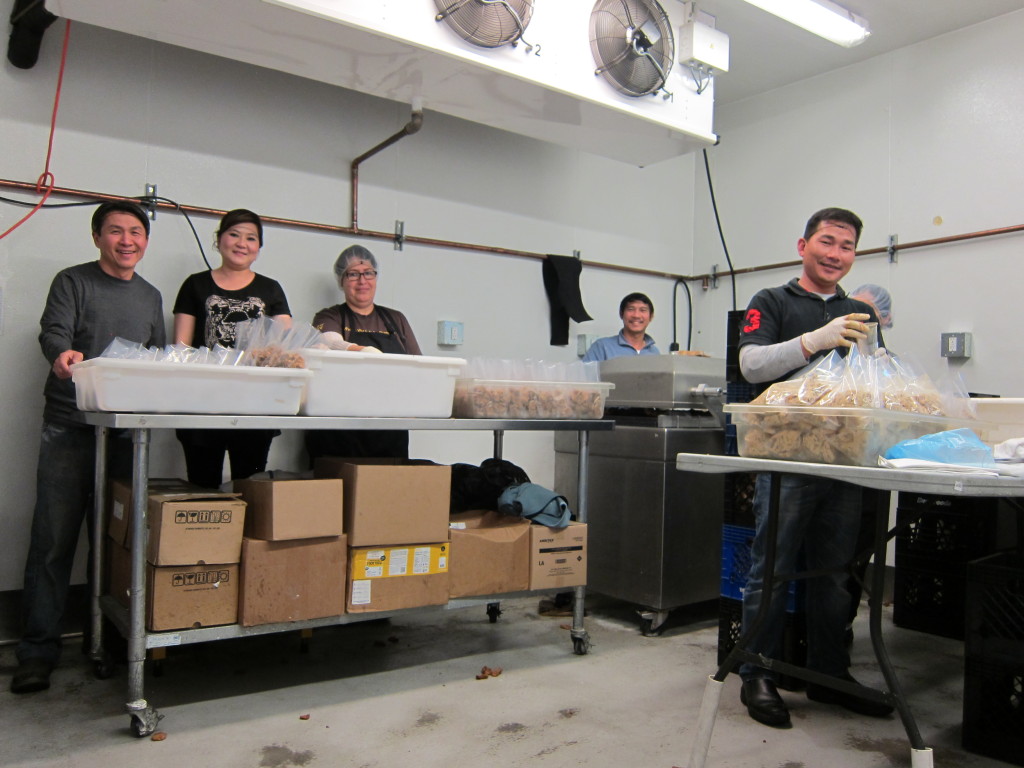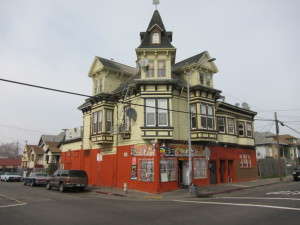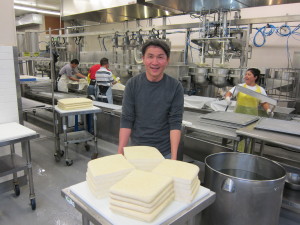
By Sharon Simonson
WEST OAKLAND—For an instant after Minh Tsai opens the metal front door of his West Oakland tofu manufacturing plant, I wonder, ‘Who is this man?’ The Hodo Soy founder and chief executive is dressed in a hairnet, a faded blue, crew-neck long-sleeved t-shirt and sagging blue jeans. My mind connects the face to a photo on the company’s website.
A note taped to the front door instructs visitors to call to announce their arrival. “We’ll send someone out to get you,” the receptionist’s voice crackled through the intercom after I call. A moment later, Minh pushes open the door with a smile and beckons me inside. I had not expected the company founder to wear a hairnet.
The Viet Nam Project
He leads me into a small dark room, separated from a factory floor by a pair of double doors with two small square windows that admit a bright white light. Behind the doors, the light illuminates a handful of workers wearing white aprons, hairnets and surgical gloves. They work two production lines, stirring large stainless-steel tubs brimming with yellow soybeans in various stages of transformation from whole beans floating in water to soy milk and smooth tofu to yuba, a tofu delicacy.
Minh hands me a hairnet and booties to cover my shoes. We are going to pass through the food production area, he explains, and everyone has to wear both. Once I am outfitted, he pushes through the doors.
Inside, the air is steamy and fragrant from the heat and water used to cook the beans. A thin film of moisture coats the concrete floor, barely moving toward drains as workers separate beans from whey, spilling as they go. We ascend a narrow staircase to an open room divided between work area with desks, and break area, where an armchair and a couple of couches are pulled together. He offers me the armchair, the best seat.
The office is more jumbled than normal, he explains. The business is expanding to a building across the street where he expects to put all operations outside of food production.

Born in Ho Chi Minh City (the former Saigon), Minh came to the United States as a child in 1981, escaping Vietnam by boat and ending in Malaysia. His U.S. experience in many aspects epitomizes the American immigrant dream— opportunity, hard work, success — “the Kool-Aid,” he calls it. The actuality of American life has been more nuanced.
For his parents, it has meant mostly self-sacrifice. In Vietnam they were teachers, members of the intellectual class, but neither spoke English. In the United States, his mom became a seamstress and hairdresser. His father began delivering newspapers and over the course of 25 years became a journalist. “America is about class, not race, about intellectual- and net-worth wealth. That is where the opportunities lie,” he says.
Minh attended San Francisco University High School in the city’s Pacific Heights neighborhood on scholarship. An enclave for the “sons and daughters of politicians and the corporate titans in San Francisco,” the school unveiled the larger economic and cultural spectrum beyond his family’s Bayview-Hunters Point apartment. Again with the help of scholarships, he earned undergraduate and graduate degrees in economics at Columbia University with a focus on how developing economies grow.
He started Hodo Soy in the early 2000s after the U.S. economy endured multiple recessions in tight succession and his employer, Charles Schwab Corp., experienced some of the largest employee layoffs among Wall Street firms. He disliked what he saw as the excessive volatility and believed food production offered an antidote. Personal passion and market opportunity pushed him to tofu. “I grew up eating delicious tofu. My grandfather who I lived with and I would go buy fresh tofu and soy milk every morning” in Vietnam, he said.
Today he sells organic, soybean-based products retail and wholesale, purchasing all of his non-genetically modified beans in the United States. Whole Foods grocery stores, Costco and Chipotle Mexican Grill are among his customers. He has expanded into Los Angeles, Arizona, the Pacific Northwest, and most recently on May 7, the East Coast with distribution in the Baltimore-Washington, D.C., metro area. “We have spent two years figuring out how to extend the shelf life of the product to 60 days from 20 days. We didn’t change the ingredients or the way we make it, just the way we pasteurize it,” he said. “It was hard.”

Me: Why did your family come to the United States?
Minh: There was a lot of persecution of Intellectuals post ’75 (the year that Saigon, the capital of South Vietnam, fell to the North Vietnamese Communists), and we happen to be ethnic Chinese, which added to some of the persecution. There had been a war in 1979 between China and Vietnam. The Chinese in Vietnam were considered the fifth column. The choices were to leave the country, go back to China or declare allegiance to Vietnam, which is ironic because my parents are very much ethnic Vietnamese. My parents didn’t have jobs. They couldn’t teach any more unless they taught the doctrine. Being ethnic Chinese prevented them from any jobs in government. They were also concerned about me, and my two siblings. How are we going to raise our kids and how are they going to get a decent education? So they left.
Me: When did you come?
Minh: I was 11-years-old. Fifth grade was my first year of school. I wasn’t fazed by anything here necessarily. I would fight if I got bullied. I was respectful of teachers, and I didn’t like the fact that I couldn’t communicate. I spoke a lot of languages — Chinese dialects and Vietnamese — but not English. It took a couple of years to get comfortable with the language. I think a lot of immigrant kids have gone through so much in their own countries that America is in some ways strange and new and in some ways a piece of cake. You don’t worry about starving or if my dad is going to come home from work. But a new set of worries comes in. How are you going to learn English or communicate or get a job, and how your parents have to suffer.
Me: Did you understand what was happening?
Minh: No. Your parents lie to you about what you are going to do, and then you leave your country forever. ‘We are going on vacation kids.’ That is a common experience.
Me: Are there benefits to being an immigrant in America?
Minh: I am the recipient of a lot of goodwill, and I’m paying it forward in ways that are more than I received. If I am a stock, I was a good investment. That encapsulates my worldview. You face racism, bigotry, but they are much more universal than America. It’s more class inequity than race and ethnic inequity.

Me: What informed your impressions of America before you came?
Minh: Food magazines in English. America was a land of food and really beautiful, delicious cakes. I had no other impression of America at all, even when I was on the plane.
Me: You seem at ease with the press, which surprises me because I didn’t find much about you online.
Minh: I hope I am at ease in general. We try to be transparent as far as how we make our product and so from that standpoint I’m not too concerned about secret recipes. (If you look at the label of our products, there is) nothing you wouldn’t understand in terms of the ingredients and where they come from.
Me: Why did you choose to start a business in food production?
Minh: I like tofu, and I was surprised at the poor quality of tofu that existed in the Bay Area. It was around the time of Scharffen Berger chocolates and premium olive oil and when the Bay Area’s farmers markets were beginning to expand. It was pre-food trucks, but a time when the premium products of categories were being unveiled, and it was a time when people were beginning to care about where their food came from. There was a confluence of interest in local food and interest in ingredients and organic and premium, so all of those ideas. I thought, why not make a good tofu and see if people want it?
I also recognized that in this tofu world there were only two categories, the mom-and-pop shops in neighborhoods and the really big companies. I wanted to exploit that. Mom and Pop don’t want and don’t know how to deal with organic certification. The big guys in the stores, the quality wasn’t there, but people were stuck with it.
Me: What are your plans for your business?
Minh: I don’t know. I’m doing this because I have wonderful colleagues, time to spend with my family and because I’m learning as a manager, food operator and producer. So as long as these elements are there …
(Excessive) growth is unsustainable, and it causes people who work for you to be unhappy. I believe in growth, but it has to be sustainable. I have great role models: (Berkeley-based) Acme Bread Co. is a great model; (Berkeley-based) June Taylor Jams. These are people in the business for 30 years who have seen slow growth, and they are still successful, and they are very focused, and they have a great company culture.
(Photos by Sharon Simonson)